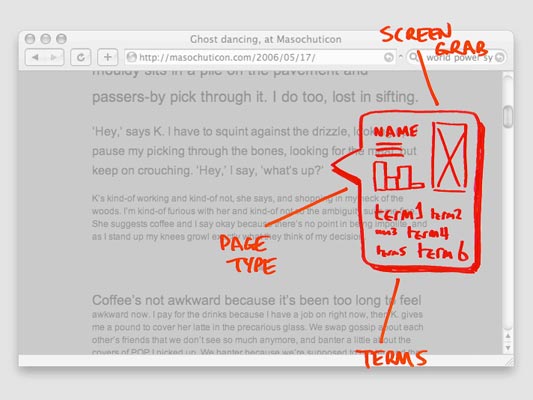Back in June, at reboot8, I presented a series of web browser enhancement ideas based on an investigation of the human senses. (The slides and my notes are online: Making Senses.)
The concept of taste led me to imagine what it would be like to take a hyperlink on a webpage, and pop it in your mouth (taste starts on slide 7). Just like our tongue picks up a 4 or 5 flavours, but sometimes we really enjoy a salty or bitter taste and sometimes we don’t, what are the 4 or 5 tastes of a webpage that we like depending on our mood and nutritional requirements of the day?

In my sketch, tasting a link involves hovering over it and having a flavour summary pop up. This includes a thumbnail of the page at the end of the hyperlink, it’s extracted terms (corresponding to the smell), and a bar chart of the 4 page tastes (flavour is a combination of all of these). The 4 I chose, with only a little thought, were:
- Is it an outward-linking page, like a contents page, or an inwardly focused page like an essay?
- Is it frequently updated?
- Is the text more in the 3rd person, like a corporate or academic page, or more about the 1st person–subjective, like a blog or journal?
- Do many people link to this page, ie what is its pagerank?
They’re okay, as tastes, I think, but really could be better.
Fast forward a few months…
At eurofoo06, Ben Gimpert presented on the “Theomatics of Food” (he has a culinary background). He spoke about mouthfeel, that sensory experience of taste, materiality, stickiness… it’s a grand word.
Where I really pricked my ears up was when Ben joined taste to mouthfeel. What is the feel, he asked, of the main tastes? He speculated:
- “Sour” mouthfeel: pucker-y
- “Salty” mouthfeel: chewy
- “Bitter” mouthfeel: coating-y
- “Sweet” mouthfeel: crunchy
(I don’t recall whether he mentioned umami/pungent or spicy in this section too.)
Now this I like. Given those 4 tastes, and their corresponding feelings, are what we need to make a first-pass judgement on whether we need the buckets of chemicals available in any given food… could I use these real tastes to make the equivalent 4 for webpages?
What does my browser-mouth taste when I click a link? What are the basic flavours of HTML? What is the pagefeel?
So I think I’ll revise my original 4 web tastes. They’ll still take a lot of datamining to calculate, but that’s fine. Perhaps crunchy pages are like popcorn, ones people stay on for not much time, but when they click away it tends to be on another, almost identical page. Coating-y pages are ones that linger… could these be social sites, where you get embroiled in the community, sticky sites?
Chewy sites are long and worthwhile: academic papers, pages that are knowledge hubs, using keywords from a lot of separate parts of the web. And I’m not sure what pucker-y/sour is. Sour makes me think of lemons, which makes me think of citric acid at the centre of the metabolic cycle, which tastes nasty but is at the middle of all life. Perhaps the equivalent for the web is hyperlinks. Pages with a lot of hyperlinks on them are the concentrated stuff of life on the web, and so they taste very, very sour.
Okay, enough of that silliness.
I still think it’s worth taking huge quantities of every metric we can gather about the web and web browsing behaviour – page linger time, click-away time, search terms, text reading age, word tense, link network position, everything – and datamining it as much as we can. Maybe out of all of that we’ll find some stable metrics for describing pages, possibly even those pagefeels, and those will be great additions to search engines and web browsers.
Alternative taste suggestions welcome!
One Comment or Trackback
1. Ben Gimpert said on 5 October 2006...
You were right — I didn’t connect umami with a mouthfeel. My own take on pagefeel data mining is at “http://somethingmodern.com/blog/?p=10″.